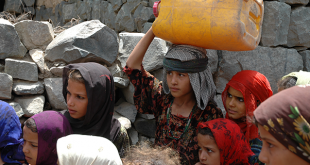The United Nations World Food Programme (WFP), the world’s largest humanitarian agency, has started a relief fund for the famine-threatened Sahel region of West Africa. Unless humanitarian aid is rushed in, eight countries which make up the Sahel region are at risk of mass starvation.
The charity Save the Children has likewise started a relief fund for West Africa, urging the world to respond before mass famine takes hold. Save the Children warns, “The greatest tragedy is that the world sees disasters such as this coming but fails to prevent them.”
Map of the Sahel region of West Africa. Shaded areas can quickly descend into famine if humanitarian aid does not arrive. (map courtesy USAID Famine Early Warning System)
Individuals can donate to these funds and help save lives in the eight Sahel countries which have suffered a massive drought: Niger, The Gambia, Mauritania, Mali, Burkina Faso, Senegal, Chad, and Cameroon.
Mothers and their babies wait in line in a maternal health care centre in Niamey, Niger, where WFP provides supplementary feeding for moderately malnourished children under three years of age. (WFP/Rein Skellerud)
Niamey, Niger, maternal health care center: a child eats his ration of Supplementary Plumpy – a nutritious peanut-based product packed with vitamins, minerals, and milk proteins. If children receive this food, they will survive the crisis. Aid agencies are low on funding to provide the food. (WFP/Rein Skellerud)
Already children in West Africa have perished from malnutrition. The World Food Programme has warned for months that the hunger crisis in West Africa could reach epic proportions during the summer. WFP says, “Malnutrition rates, particularly affecting children under two, are generally high in the Sahel, and usually rise during the lean season, leading to significant peaks in acute malnutrition and mortality.”
The lean season, or period between harvests, runs through September. Severe drought, though, has drastically reduced the amount of food farmers can produce, leading to shortages and high prices for any available supply. Conflict in Northern Mali has created a refugee crisis which is adding to the disaster in the region.
WFP is pleading for funds as it plans to feed over nine million people in the Sahel. The smallest children are most at risk because they need nutrients at this early age or they will suffer lasting physical and mental damage. When the malnutrition reaches its severest, children will die, as is already happening in the Sahel.
Special foods like plumpy’nut can save children’s lives, but low funding for humanitarian aid often prevents enough supplies from being deployed quickly enough into the field. If the world would act faster, and more consistently, famines could be prevented.
Country Director Vitoria Ginja speaking to a beneficiary at Janjanbureh distribution point in the Central River Region, The Gambia. (WFP photo)
Last year the world waited too long before responding to the hunger crisis in the Horn of Africa. Massive drought struck Somalia, Kenya, and Ethiopia, but it was not until summer was well underway that the world’s attention shifted significantly to the disaster.
Save the Children says, “Early signs of an oncoming food crisis were clear many months before the Horn of Africa emergency reached its peak. Yet it was not until the situation had reached crisis point that the international system started to respond at scale.”
This year a similar tragedy awaits West Africa unless the world responds now.
You can donate to the relief funds at the World Food Programme and Save the Children.
See a series of articles on the Sahel Food Crisis.
 Blogcritics The critical lens on today's culture & entertainment
Blogcritics The critical lens on today's culture & entertainment



